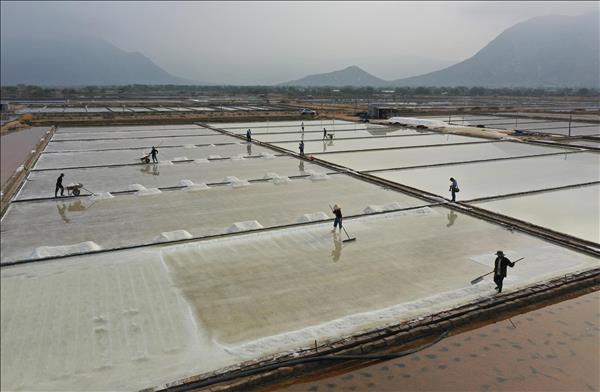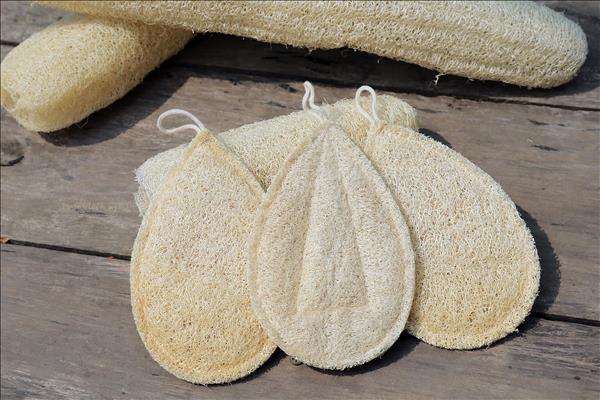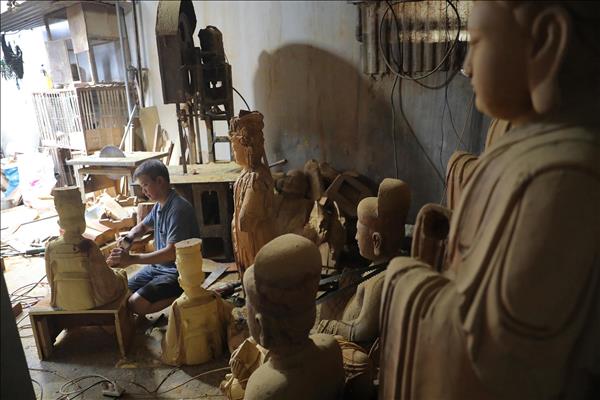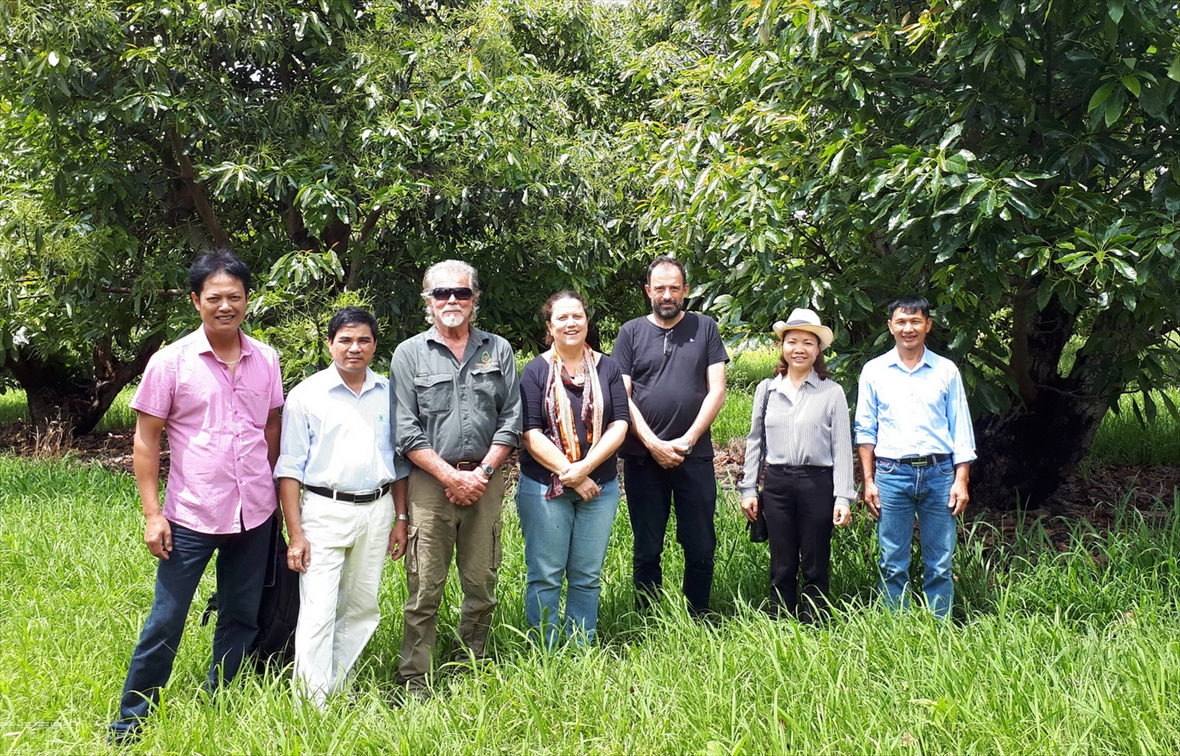Kien Cuong Enterprise in Dak Lak Province has not only successfully applied a model of civet coffee production, creating a unique coffee brand, but has also helped 20 households in the area apply the model. This model has helped raise people’s awareness of conserving the rare and precious civets as well as increase the value of the agricultural products of the coffee growers in Dak Lak.
A native of Hung Yen Province, Nguyen Manh Cuong went to Dak Lak in the early 70s with a desire to change his life with growing and selling coffee. In 1994, while passing a shop selling ornamental birds in Buon Ma Thuot, he saw two baby civets on sale. He bought them to raise on his coffee farm.
He had to learn how to raise the civets because there was no ready information on how to care for these animals. His civets grew up healthy and Cuong had the idea of raising civets to preserve an animal species in danger of extinction in Tay Nguyen (the Central Highlands). After buying two more civets, he asked for permission for civet farming and won the approval from the local forest management agency
Recalling that time, Cuong said: “I went to the villages of the E De ethnic people in Ea Sup to learn about the wild civets’ reproduction and applied it to civet raising on my farm.” With accumulated knowledge, in 2009 he successfully bred the first pair of civets.
When the civets could reproduce in a semi-wild environment, Cuong had the new idea of producing civet coffee which was internationally considered the “king of coffee”. But when he embarked on the implementation, he met untold difficulties. The first difficulty was that he needed a large number of civets to produce civet coffee. It took him five more years to increase his initial four civets to 270 civets.
The greatest difficulty facing Cuong was that he had to spend a lot of time and effort learning the process of civet coffee production. In 2000 the world’s most famous civet coffee came from Indonesia, and how to produce civet coffee was still a secret. Cuong persistently went to every hamlet of the E De and Mnong ethnic groups in Buon Don and La Districts to learn from the elders who had experience on wild civets and on how to preserve civet coffee.
When the first cups of civet coffee with a delicious and aromatic flavour produced in Cuong’s farm were introduced, he knew that his idea of producing a coffee product of high quality was feasible. In 2012, Master Chef Martin Yan visited Cuong’s farm and said the civet coffee brand named Kien Cuong had a distinctive taste and flavour.
From this initial achievement, Cuong invested in building three farms specialising in planting coffee and farming civets in a semi-wild environment. The coffee production season coincided with the coffee harvest time in Tay Nguyen in November and December. So, Kien Cuong enterprise’s workers went to all parts of Dak Lak to buy the best coffee beans to feed the civets.
According to Nguyen Van Tinh, a civet care worker at Cuong’s farm, the civets only select ripe coffee berries without bugs and pesticides to eat. Three to four hours after eating, they defecate coffee beans which still have the endocarp. A civet defecates nearly one gram of coffee beans per night.
Kien Cuong enterprise has expanded its civet farms and invested in coffee production facilities. Each season, it produces 900kg of civet coffee which sells for 3,000 USD/kg and is mainly consumed by the Japanese and Taiwanese.
Since 2012 Kien Cuong enterprises has regularly opened training courses on the methods of civet farming and civet coffee production for the farmers in Tay Nguyen, helping them become aware of civet conservation and increase their agricultural products. Currently, over 20 households in Dak Lak have applied Kien Cuong enterprise’s model of civet coffee production. Cuong said: “Our business operates not for individual benefits, but we hope coffee growers will make the highest profit.”
He had to learn how to raise the civets because there was no ready information on how to care for these animals. His civets grew up healthy and Cuong had the idea of raising civets to preserve an animal species in danger of extinction in Tay Nguyen (the Central Highlands). After buying two more civets, he asked for permission for civet farming and won the approval from the local forest management agency
Recalling that time, Cuong said: “I went to the villages of the E De ethnic people in Ea Sup to learn about the wild civets’ reproduction and applied it to civet raising on my farm.” With accumulated knowledge, in 2009 he successfully bred the first pair of civets.
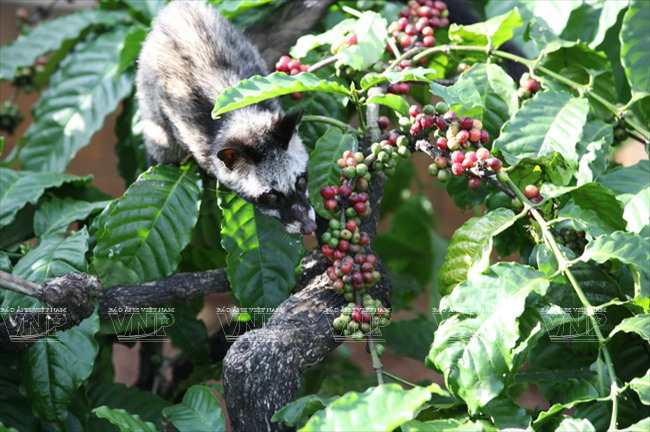 A civet eats coffee beans on a farm of Kien Cuong Enterprise. Photo: Tat Son/VNP 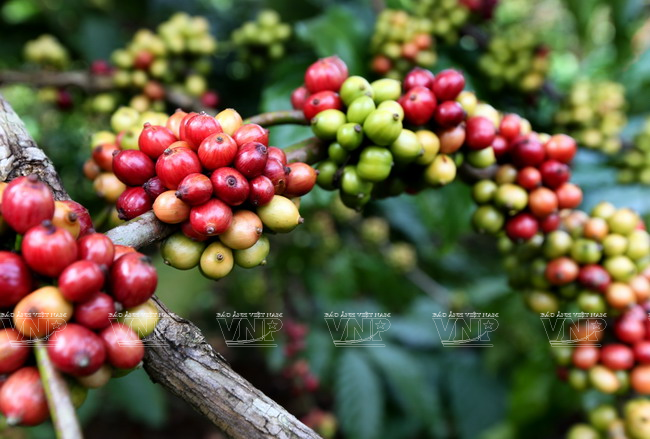 Coffee beans for civet feeding must be big and well ripe. Photo: Tat Son/VNP 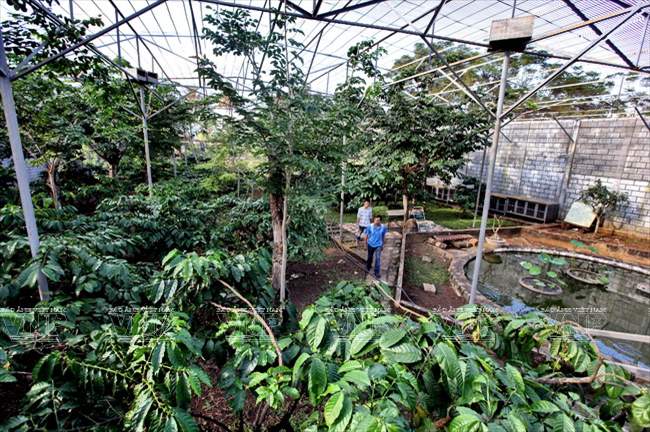 A coffee garden for raising civets of Kien Cuong Enterprise. Photo: Tat Son/VNP 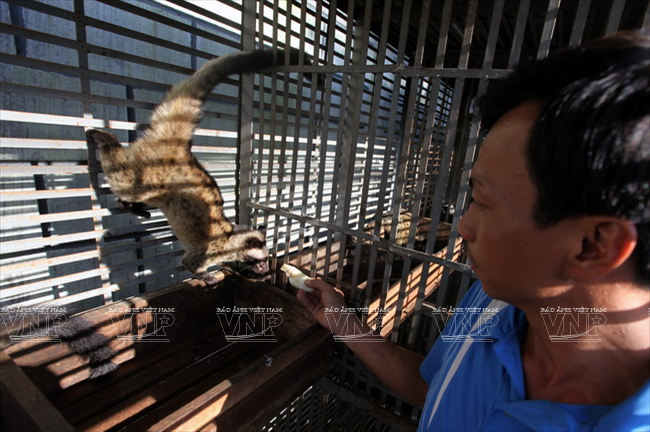 Besides coffee beans, civets are fed by other food in their cage. Photo: Tat Son/VNP 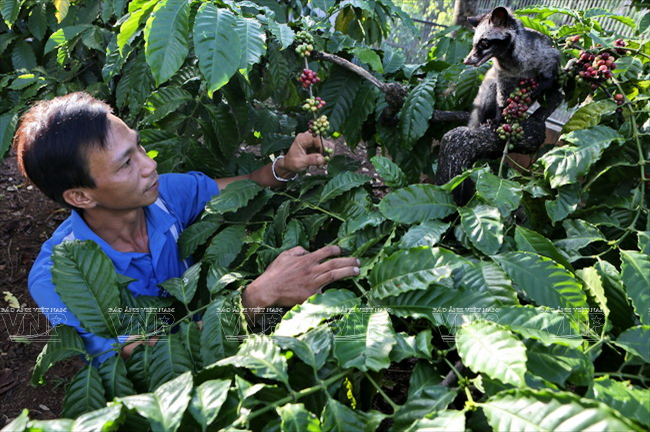 Farmers must regularly check the health of civets. Photo: Tat Son/VNP 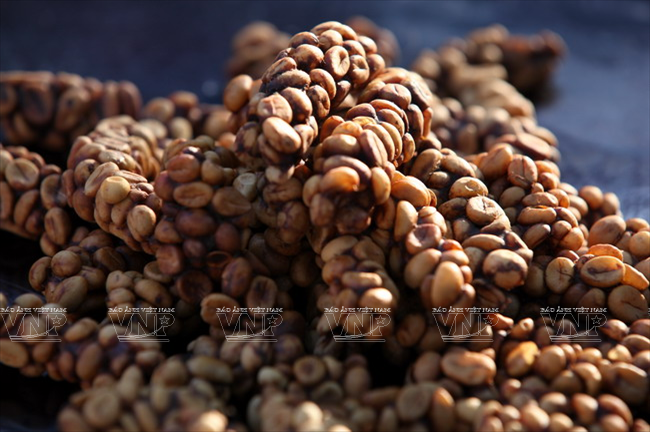 Each year, Kien Cuong Enterprise provides the market with about 900kg of civet coffee. Photo:Tat Son/VNP |
| « Civet coffee products of Kien Cuong enterprise have been certified for a registered trademark and a useful solution titled “Patent for civet coffee production method” by the Department of Intellectual Property (Ministry of Science and Technology). In 2011, DANIdA’s Global Competitiveness Facility (GCF) signed an agreement with Kien Cuong enterprises on funding the project “Technical services for raising and supplying the breeding civets, and producing and processing civet coffee for export”. » |
The greatest difficulty facing Cuong was that he had to spend a lot of time and effort learning the process of civet coffee production. In 2000 the world’s most famous civet coffee came from Indonesia, and how to produce civet coffee was still a secret. Cuong persistently went to every hamlet of the E De and Mnong ethnic groups in Buon Don and La Districts to learn from the elders who had experience on wild civets and on how to preserve civet coffee.
When the first cups of civet coffee with a delicious and aromatic flavour produced in Cuong’s farm were introduced, he knew that his idea of producing a coffee product of high quality was feasible. In 2012, Master Chef Martin Yan visited Cuong’s farm and said the civet coffee brand named Kien Cuong had a distinctive taste and flavour.
From this initial achievement, Cuong invested in building three farms specialising in planting coffee and farming civets in a semi-wild environment. The coffee production season coincided with the coffee harvest time in Tay Nguyen in November and December. So, Kien Cuong enterprise’s workers went to all parts of Dak Lak to buy the best coffee beans to feed the civets.
According to Nguyen Van Tinh, a civet care worker at Cuong’s farm, the civets only select ripe coffee berries without bugs and pesticides to eat. Three to four hours after eating, they defecate coffee beans which still have the endocarp. A civet defecates nearly one gram of coffee beans per night.
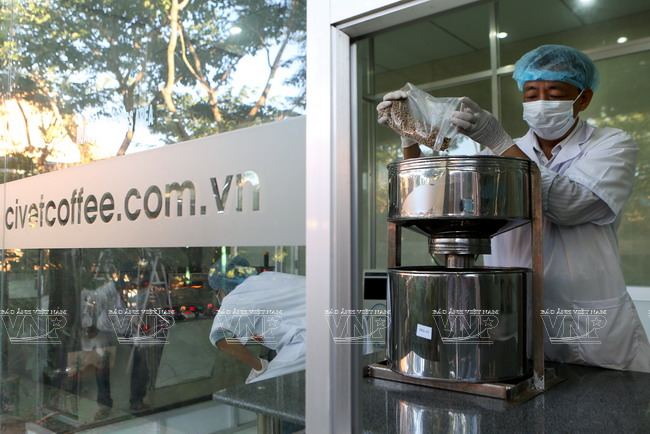 Roasting and grinding coffee at Kien Cuong Enterprise’s workshop. Photo: Tat Son/VNP 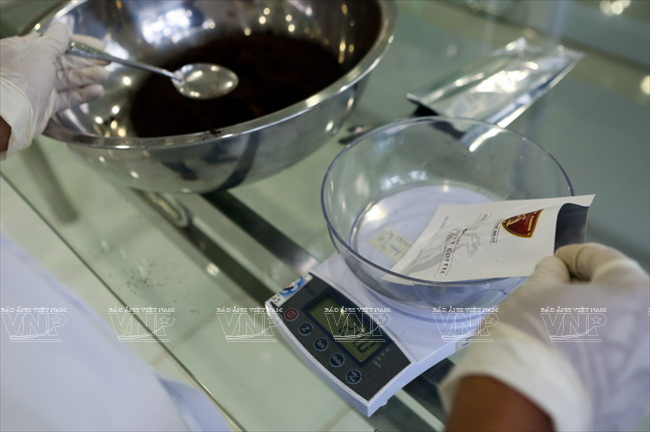 Packing civet coffee. Photo: Tat Son/VNP 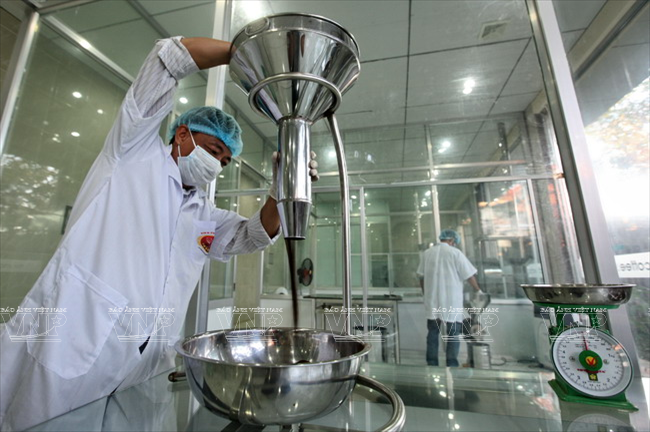 Kien Cuong Enterprise pays much attention to food safety and hygiene during the production process. Photo: Tat Son/VNP 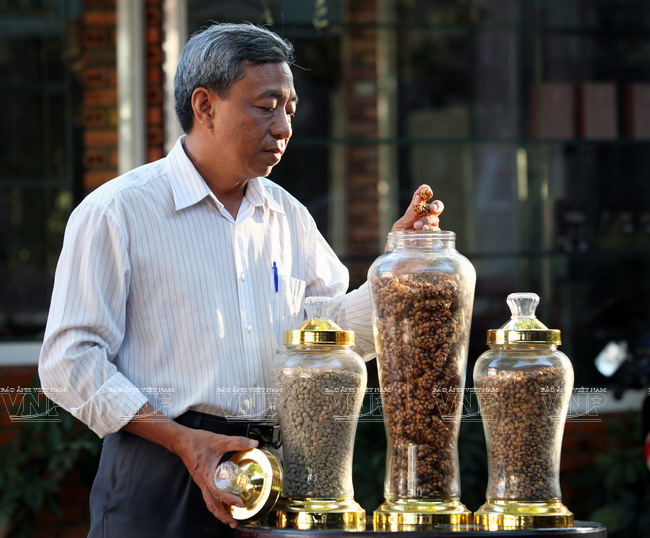 Nguyen Manh Cuong is one of those who are successful in producing civet coffee in Dak Lak Province. Photo: Tat Son/VNP  Civet coffee currently sells for 3,000 USD/kg. Photo: Tat Son/VNP 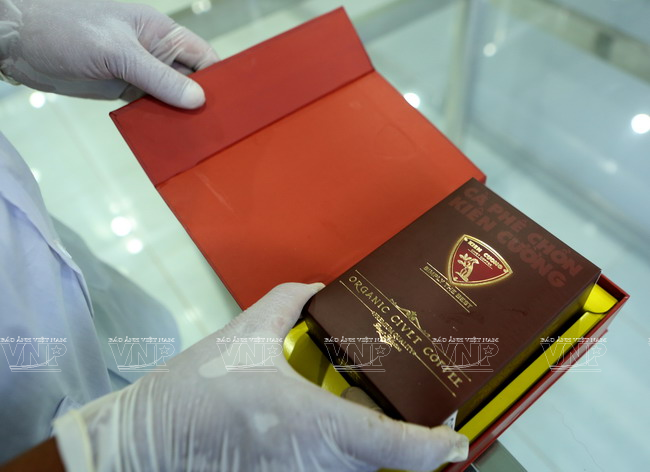 Kien Cuong civet coffee has become a value brand name both at home and abroad. Photo: Tat Son/VNP |
Kien Cuong enterprise has expanded its civet farms and invested in coffee production facilities. Each season, it produces 900kg of civet coffee which sells for 3,000 USD/kg and is mainly consumed by the Japanese and Taiwanese.
Since 2012 Kien Cuong enterprises has regularly opened training courses on the methods of civet farming and civet coffee production for the farmers in Tay Nguyen, helping them become aware of civet conservation and increase their agricultural products. Currently, over 20 households in Dak Lak have applied Kien Cuong enterprise’s model of civet coffee production. Cuong said: “Our business operates not for individual benefits, but we hope coffee growers will make the highest profit.”
Story: Thong Thien - Photos: Tat Son
bdAnh

